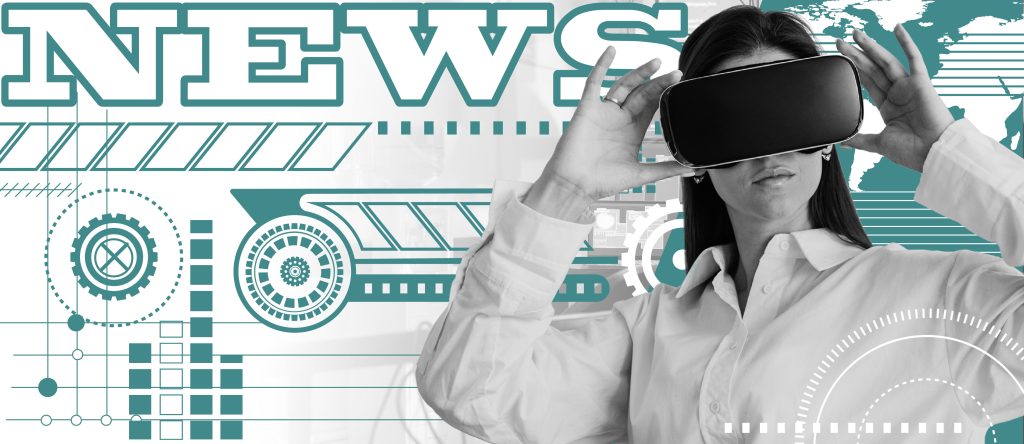
This newsletter edition has been elaborated by Garret Edwards
MetaverseUA Chair Newsletter #19 – May 2025
Hello there, nerds of the virtual realm 👾
Spring has arrived, and so has your favorite source of XR gossip, AI drama, regulatory despair, and—this time—some unlikely cowboys. From digital twins saving BMW millions, to Spain’s latest facepalm with Brussels, to virtual fences redefining how goats behave in the EU… We’ve got it all. Buckle up. Let’s go to it.

🚗 Digital Twins, Real Impact: The Industrial Metaverse in Motion
While Meta’s vision of virtual meetings is still looking for its breakthrough moment, BMW is building real cars with the help of the digital kind. Using Nvidia’s Omniverse platform, the automaker has gone full Matrix: 3D digital twins of entire factories, populated by pixel-perfect replicas of robots, machines, and even human workers (no word yet on if they complain about overtime).
This “industrial metaverse” may not let you dance at a virtual concert, but it does let BMW avoid multi-million euro screwups when redesigning production lines. And when you’re simulating robots, warehouses, and lasers, you want things to be slightly more exact science and slightly less Mark Zuckerberg on a surfboard.

🇪🇺 Spain, We Need to Talk… Again
Brussels is done being ghosted. The European Commission has taken Spain (along with a few other forgetful classmates) to the Court of Justice of the European Union for not implementing the Digital Services Act (DSA) on time.
While the CNMC (Comisión Nacional de los mercados y la Competencia) was designated as national coordinator, it still lacks the superpowers needed to oversee tech giants like Meta or TikTok. Why? Because our ‘decreto ómnibus’ took a nosedive in Congress, leaving the whole process stuck in legislative limbo.
Spoiler: this could lead to fines of up to 6% of a company’s global turnover. No pressure.

🧠 From Pixels to Profile: The Biometric Side of the Metaverse
In the latest open-access gem from Frontiers in Virtual Reality, Giovanni Sorrentino and Javier López-Guzmán explore how our avatars in the metaverse leak more data than we realize—biometric, behavioral, and inferred information that can paint eerily detailed portraits of who we are.
Turns out, when your avatar looks like you, moves like you, and reveals more than you ever consented to, the old privacy rules start to glitch.
The article advocates for updated legal frameworks on both sides of the Atlantic, as avatars are increasingly treated as personal data containers—walking, talking data points dressed in skins.
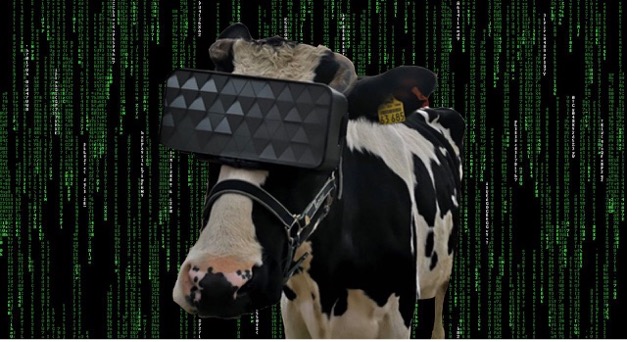
🐄 Moo-ve Over, Barbed Wire: Virtual Fencing Gets Real
Forget tractors. Today’s real innovation in farming is coming via GPS-enabled cow collars and virtual fencing from Nofence. Instead of erecting physical barriers, farmers use an app to set grazing zones. The result? More efficient land use, better soil regeneration, and livestock that literally learn where the line is.
It’s like The Sims, but with actual livestock and EU subsidies.
Pepe Ríos, a cattle farmer in Teruel, now manages over 3,500 hectares thanks to this system—without hiring extra staff. Not bad for a startup with Bluetooth and a dream.
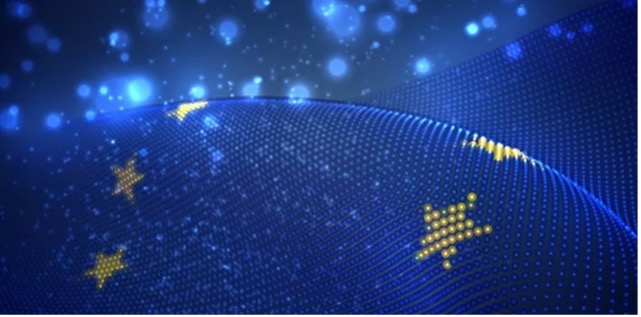
🌐 Brussels Logs In: Web 4.0 Gets a Governance Blueprint
If you blinked, you may have missed it, but history was beeing written in Brussels. The Global Multistakeholder High-Level Conference on Governance of Web 4.0 and Virtual Worlds, organized by the European Commission, brought together policymakers, researchers, industry players, and yes—our very own Javier López-Guzmán— to ask a deceptively simple question: How do we deal with the next version of the Internet?
The highlight? The adoption of an official Outcome Document, a milestone text that sets the tone for global cooperation in the governance of immersive technologies. The document calls for an inclusive, human-centric, and interoperable digital future, with strong emphasis on fundamental rights, transparency, safety, and innovation.
Put simply, the EU isn’t just joining the conversation about the metaverse. It’s drafting its blueprint. Whether you’re building avatars or writing regulations, this governance debate is about to shape your digital tomorrow. And yes, it’s about to get (virtually) real.

📢 Don’t Forget: The Congress is Coming!
The II International Congress “Metaverse for the Good” is literally just around the corner—June 11-12, 2025, at the University of Alicante. The Call for Submissions is closed, but you can still register as an attendee here.
Oh, and the results from our public consultation on emerging technologies (developed with Inmersiva) will be unveiled on June 13. Expect fireworks. Intellectual ones, of course.
We look forward to seeing you in Alicante!
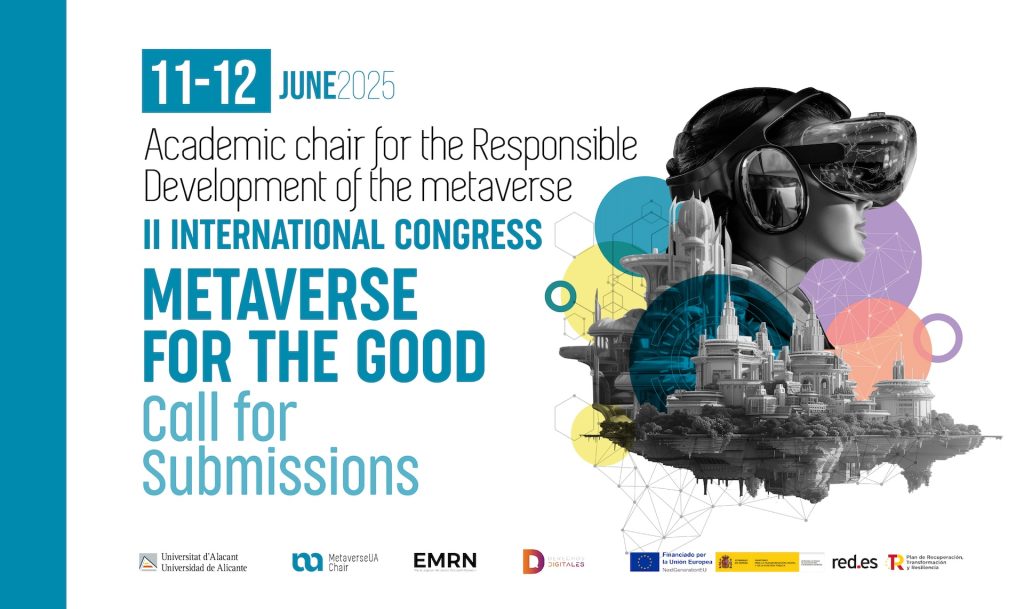

🌀 Ctrl+Alt+Goodbye!
That’s it for this month’s trip through the weird, wonderful, and occasionally worrying world of XR and AI. Congratulations on making it to the end—clearly, you’re our kind of nerd!
In any case, thank you for staying curious—and caffeinated. We’ll be back soon with more stories that make you question whether that blinking light in your smart fridge is watching you back.
Until next time, may your code run smoothly, and your servers stay cool.
Garret Edwards
Últimas noticias y eventos
-
 24 Oct 2025 NewsMetaverseUA Chair Newsletter #21 – October 2025
24 Oct 2025 NewsMetaverseUA Chair Newsletter #21 – October 2025 -
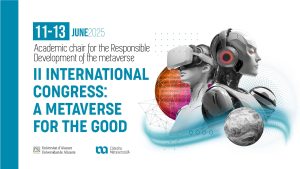 28 Jul 2025 NewsHit play: Recordings from the II International Congress now available!
28 Jul 2025 NewsHit play: Recordings from the II International Congress now available! -
 28 Jul 2025 Activity logII International Congress: A Metaverse for The Good Part II: EspañaXR - Tecnologías inmersivas, emprendimiento y políticas públicas
28 Jul 2025 Activity logII International Congress: A Metaverse for The Good Part II: EspañaXR - Tecnologías inmersivas, emprendimiento y políticas públicas


